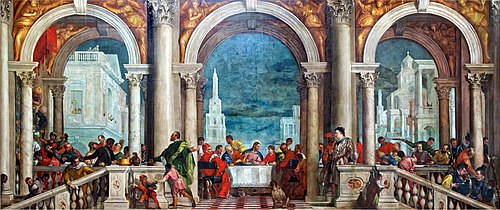Kto nauczył Francuzów jeść widelcem?: Różnice pomiędzy wersjami
| Linia 125: | Linia 125: | ||
=== Obserwacje Coryata === | === Obserwacje Coryata === | ||
{{ Cytat | {{ Cytat | ||
| Zaobserwowałem we wszystkich odwiedzonych przez mnie włoskich miastach i miasteczkach zwyczaj, którego nie ma w żadnym innym z krajów, przez które podróżowałem, i o którym sądzę, | | Zaobserwowałem we wszystkich odwiedzonych przez mnie włoskich miastach i miasteczkach zwyczaj, którego nie ma w żadnym innym z krajów, przez które podróżowałem, i o którym sądzę, iż nie jest znany w żadnym kraju chrześcijańskim poza Italią. Włosi, a także większość mieszkających we Włoszech cudzoziemców, zawsze przy posiłku posługują się niewielkim widelcem podczas krojenia mięsa. Krojąc mięso nożem, trzymanym w jednej ręce, przytrzymują je sobie w misie widelcem, który dzierżą w drugiej ręce. Gdyby ktokolwiek, siedząc przy stole w towarzystwie współbiesiadników, nieroztropnie dotknął palcami misy, z której wszyscy wykrawają sobie mięsiwo, to byłoby to poczytane za grubiaństwo i złamanie zasad dobrych manier, który to błąd ukarano by przynajmniej srogim zmarszczeniem brwi, jeśli nie słowną reprymendą. Ten sposób pożywiania się jest, jak rozumiem, stosowany powszechnie w całych Włoszech, przy czym widelce ich są zrobione z żelaza lub stali, a niektóre ze srebra, lecz tych drugich używa tylko szlachta. Ta ichniejsza osobliwość bierze się stąd, iż Włosi nie są w stanie ścierpieć, by ktokolwiek tykał ich strawę palcami, widząc, jak palce nie u każdego są równie czyste. | ||
| oryg = I observed a custom in all those Italian cities and towns through the which I passed, that is not used in any other country that I saw in my travels, neither do I think that any other nation of Christendom doth use it, but only Italy. The Italian and also most strangers that are commorant in Italy, do always at their meals use a little fork when they cut their meat. For while with their knife, which they hold in one hand, they cut the meat out of the dish, they fasten their fork, which they hold in their other hand, upon the same dish, so that whatsoever he be that sitting in the company of any others at meal, should unadvisedly touch the dish of meat with his fingers from which all at the table do cut, he will give occasion of offence unto the company, as having transgressed the laws of good manners, in so much that for his error he shall be at the least brow-beaten, if not reprehended in words. This form of feeding I understand is generally used in all places of Italy, their forks being for the most part made of iron or steel, and some of silver, but those are used only by gentlemen. The reason of this their curiosity is, because the Italian cannot by any means endure to have his dish touched with fingers, seeing all men's fingers are not alike clean. | | oryg = I observed a custom in all those Italian cities and towns through the which I passed, that is not used in any other country that I saw in my travels, neither do I think that any other nation of Christendom doth use it, but only Italy. The Italian and also most strangers that are commorant in Italy, do always at their meals use a little fork when they cut their meat. For while with their knife, which they hold in one hand, they cut the meat out of the dish, they fasten their fork, which they hold in their other hand, upon the same dish, so that whatsoever he be that sitting in the company of any others at meal, should unadvisedly touch the dish of meat with his fingers from which all at the table do cut, he will give occasion of offence unto the company, as having transgressed the laws of good manners, in so much that for his error he shall be at the least brow-beaten, if not reprehended in words. This form of feeding I understand is generally used in all places of Italy, their forks being for the most part made of iron or steel, and some of silver, but those are used only by gentlemen. The reason of this their curiosity is, because the Italian cannot by any means endure to have his dish touched with fingers, seeing all men's fingers are not alike clean. | ||
| źródło = {{Cyt | | źródło = {{Cyt | ||
Wersja z 13:27, 27 lut 2024
| To są ludzie, którzy uczyli się od nas jeść widelcem parę wieków temu… |
| — Bartosz Kownacki, wypowiedź w programie „Jeden na jeden”, TVN24, 12 października 2016 r. |
- TVN24, Wiceszef MON: Francuzi to ludzie, którzy uczyli się od nas jeść widelcem parę wieków temu
- Dining with the Hermaphrodites: Courtly Excess and Dietary Manuals in Early Modern France
- Les honneurs de Venise à Henri de Valois, roi de France et de Pologne
- Diplomatic Gifts on Henri III's Visit to Venice in 1574
- Carolin C. Young, Catherine de Medici's Fork
- Barbara Ketcham Wheaton, Savoring the Past: The French Kitchen and Table from 1300 to 1789
- La fourchette de table s’impose laborieusement en France
- Les honneurs de Venise à Henri de Valois, roi de France et de Pologne
- Henri III à Venise
- Fork, 15th century, The MET
- La fuite en France (wybór źródeł)
- Reinaissance forks: a cautionary tale
- The Fork
- Co robił Henryk Walezy po ucieczce z Polski?
Pożegnanie z Polską
Żegnaj Polsko! Żegnaj ziemio wiecznych mrozów, wiecznej zimy. | ||||
— Philippe Desportes: Pożegnanie Polski, tłum. Julian Ejsmond; w: J. Ejsmond: Polska w pieśniach cudzoziemskich, Warszawa: Jan Cotta, 1915, s. 45–47
Tekst oryginalny:
|
Odpowiedź Kochanowskiego
Stójcie, męże! Nie zmykajcie, jakoby was gzy goniły. | ||||
— Jan Kochanowski: Gallo crocitanti ἀμοιβή, tłum. Julian Ejsmond; w: ibid., s. 48–52
Tekst oryginalny:
|
- Odpowiedź anonimowego Polaka: [1]
Widelce z cukru
| Po tym pięknym widowisku urządzono wystawne śniadanie złożone z wyśmienitych konfektów i owoców w cukrze, ale co było najcudowniejsze i czego nigdy później nie widziano – to noże, widelce, talerze i serwety wykonane z cukru […] | ||||
— [2]
Tekst oryginalny:
|
Pironi - "widelce" po wenecku, zapożyczenie z greki
Erazm z Rotterdamu, O wychowaniu chłopców
| Nie należy maczać palców w sosie jak wieśniak, tylko nożem wybierać z misy te kąski, które chce się zjeść; ale też nie szukać najlepszych kawałków po całej misie, jak czynią łakomczuchy, lecz brać te, które akurat leżą najbliżej.
ENGLISH: | ||||
— [3], tłum. własne
Tekst oryginalny:
|
Obserwacje Coryata
| Zaobserwowałem we wszystkich odwiedzonych przez mnie włoskich miastach i miasteczkach zwyczaj, którego nie ma w żadnym innym z krajów, przez które podróżowałem, i o którym sądzę, iż nie jest znany w żadnym kraju chrześcijańskim poza Italią. Włosi, a także większość mieszkających we Włoszech cudzoziemców, zawsze przy posiłku posługują się niewielkim widelcem podczas krojenia mięsa. Krojąc mięso nożem, trzymanym w jednej ręce, przytrzymują je sobie w misie widelcem, który dzierżą w drugiej ręce. Gdyby ktokolwiek, siedząc przy stole w towarzystwie współbiesiadników, nieroztropnie dotknął palcami misy, z której wszyscy wykrawają sobie mięsiwo, to byłoby to poczytane za grubiaństwo i złamanie zasad dobrych manier, który to błąd ukarano by przynajmniej srogim zmarszczeniem brwi, jeśli nie słowną reprymendą. Ten sposób pożywiania się jest, jak rozumiem, stosowany powszechnie w całych Włoszech, przy czym widelce ich są zrobione z żelaza lub stali, a niektóre ze srebra, lecz tych drugich używa tylko szlachta. Ta ichniejsza osobliwość bierze się stąd, iż Włosi nie są w stanie ścierpieć, by ktokolwiek tykał ich strawę palcami, widząc, jak palce nie u każdego są równie czyste. | ||||
— Thomas Coryat: Coryat's Crudities, t. 1, Glasgow: James McLehose and Sons, 1905, s. 236, tłum. własne
Tekst oryginalny:
|
Trasy przejazdu Henryka

- Z Francji do Polski
- Paryż, koniec X
- Międzyrzecz, 24 I
- Kraków, 18 II
- Z Polski do Francji
- Kraków, 14 VI
- Pszczyna
- Wiedeń, 24 VI
- Wenecja, 18 VII
- Chambéry, 2 IX
- Lyon, 6 IX
Obrazki
- Bartolomeo Scappi, Opera, ilustracja z łyżką, widelcem i nożem
- Trousse contenant 3 couteaux et une fourchette
- Henryk III w Wenecji
-
Portret Henryka III
-
Polskie poselstwo do Henryka Walezego
-
Wybór Henryka na króla polskiego
-
Wjazd Henryka do Międzyrzecza
-
Wjazd Henryka do Krakowa
-
Wyjazd Henryka z Polski
-
Spotkanie Henryka z dożą weneckim (szkic do fresku)
-
Wjazd Henryka III do Wenecji
-
Paolo Veronese, Uczta w domu Lewiego (dwie postacie używają widelców)
Przypisy
- ↑ Henrykowe itineraria rozrysowałem na podstawie następujących źródeł:
- Caroline zum Kolk, Eloïse Rocher: Itinéraire d’Henri III : Les lieux de séjour du roi d’après sa correspondance (1565--1589), w: Cour de France, Paris: 2011
- Karol Łopatecki: Jednostki odległości i szybkość podróżowania w drugiej połowie XVI stulecia w świetle traktatu Blaise'a de Vigenère, w: Przegląd Historyczny, CXII/3, Uniwersytet w Białymstoku, 2021, s. 531--562
Bibliografia
- Pascal Brioist, Florent Quellier: La table de la Renaissance: Le mythe italien, Presses Universitaires de Rennes, Presses Universitaires François-Rabelais, 2018
- Loïc Bienassis, Antonella Campanini: La reine à la fourchette et autres histoires : Ce que la table française emprunta à l'Italie : analyse crytique d'un mythe, w: La table de la Renaissance..., s. 29--88
- Deborah L. Krohn: Le livre de cuisine de la reine : un exemplaire de l'Opera de Scappi dans la collection de Catherine de Médicis, w: La table de la Renaissance..., s. 151--163
- Antonella Campanini: The Illusive Story Of Catherine de’ Medici: A Gastronomic Myth, w: The New Gastronome, Università degli studi di Scienze Gastronomiche di Pollenzo
- Kathleen Long: Dining with the Hermaphrodites: Courtly Excess and Dietary Manuals in Early Modern France, w: Folger Shakespeare Library, 10 marca 2020
- Tadeusz Przypkowski: Prologowa gawęda, w: Maja Berezowska, Stefania Przypkowska, Tadeusz Przypkowski, Magdalena Samozwaniec: Łyżka za cholewą, a widelec na stole: Mała kulinarna silva rerum, Kraków: Wydawnictwo Literackie, 1977, s. 5--16
- Gilian Riley: Table Manners and what they Looked Like: a Discussion of Visual Evidence for what People Ate and how they Handled it, w: Mark McWilliams: Food & Material Culture: Proceedings of the Oxford Symposium on Food and Cookery 2013, Devon: Prospect Books, 2014, s. 256--263
- Janusz Tazbir: Henryk Walezy, w: Andrzej Garlicki: Poczet królów i książąt polskich, Warszawa: Czytelnik, 1984, s. 345--352
- Marie Viallon: Les honneurs de Venise à Henri de Valois, roi de France et de Pologne, w: The Fifty-Sixth Annual Meeting of the Renaissance Society of America, Venice: 8--10 kwietnia 2010
- Barbara Ketcham Wheaton: Savoring the Past: The French Kitchen and Table from 1300 to 1789, Touchstone, 1996, s. 43--44, 256--
- Carolin C. Young: Catherine de' Medici's Fork, w: Richard Hosking: Authenticity in the Kitchen: Proceedings of the Oxford Symposium on Food and Cookery 2005, Devon: Prospect Books, 2006, s. 441--453














